DVT SystemVerilog IDE User Guide
Rev. 24.1.9, 26 April 2024
- Installation Checklist
- Predefined Projects
- Getting Started
- What is a Workspace
- What is a Project
- Project Natures
- Workspace and Workbench
- Refresh
- Linked Resources
- Backup and Local History
- Basic Tutorial
- Switch to the DVT Perspective
- Open a Project
- Configure the Build
- Build the Project
- Inspect the Compilation Errors
- See Comments in Tooltips
- Use Hyperlinks to Move Around in the Code
- Quickly Open a Type (Class, Module, Interface)
- Quickly Inspect the Class Hierarchy
- Quickly Open a File
- Quickly Move Inside the Editor
- Inspect the Class Hierarchy and Class Members
- Inspect the Design Hierarchy
- Inspect the Verification Hierarchy
- Browse Through All the Available Types (Classes, Modules, Interfaces)
- Look for the Implementation of an Extern Function or Task
- Search for Entities
- Use Content Assist (Autocomplete)
- Use Code Templates
- Use Module Auto Instance
- Expand Macros (Apply Preprocessing)
- Trace Macro Errors
- Track Tasks using TODO Markers
- Quickly See the Current Scope in the Status Bar
- Fold Code Regions in Order to Improve Readability
- Access the Context Sensitive Help
- Build Configurations
- Non-top files
- default.build
- Auto-config
- Simulator Log-config
- Emulating compiler invocations
- Multiple .build Files
- Compatibility Modes
- Paths
- Strings
- Comments
- Environment Variables
- Including Other Argument Files
- Build Persistence
- DVT Auto-Linked
- Run a Script Before Build
- All Build Directives
- e Language Test Files
- e Language SPECMAN_PATH
- SystemVerilog OVM or UVM Library Compilation
- Xilinx Libraries Compilation
- Intel(Altera) Quartus Libraries Compilation
- Questa Libraries Compilation
- Use of External Programs
- Compile Checks
- Content Assist (Autocomplete)
- Quick Fix Proposals
- Add Parameter to Module
- Add Port to Module
- Add Signal to Sensitivity List
- Add Virtual Qualifier to Interface Type
- Correct Spelling In Comments and Strings
- Create Class In New File
- Create File From Build Config Editor
- Create Included File
- Create Interface Class In New File
- Declare Method
- Declare Variable
- Did You Mean
- Explicitly Declare
- Fully Qualify Type
- Implement Extern Method
- Implement Missing Pure Virtual Methods
- Import Type
- Remove 'local' or 'protected' Qualifier
- Remove Signal from Sensitivity List
- Remove Signal Never Used
- Update Extern Prototype/Implementation
- Update Module Instance
- Update Virtual Method Signature
- Waive Compilation Problems
- Quick Assist Proposals
- Bind Method Call Arguments by Name
- Bind Method Call Arguments by Position
- Connect Instance Ports by Name
- Connect Instance Ports by Position
- Expand .* Port Connections
- Extract to Variable
- Extract to Method
- Extract to Module
- Move Selection to New File
- Join Extern and Implementation
- Split to Extern and Implementation
- Rename in File
- Content Filters
- Code Templates
- File Templates
- Project Templates
- > Code Formatting
- Override Functions
- Generate Getters and Setters
- Module Automatic Instantiation
- Semantic Search
- Show Usages, Readers or Writers
- Favorite Searches
- Show Constraints
- Show Instances
- Quick Search in Views
- Trace Connections
- Breadcrumb Navigation Bar
- Code Factory
- Refactoring
- Rename Refactoring
- Rename Port Across the Design Hierarchy
- Rename File
- Bind Method Call Arguments by Name
- Bind Method Call Arguments by Position
- Connect Instance Ports by Name
- Connect Instance Ports by Position
- Expand .* Port Connections
- Extract to Variable
- Extract to Method
- Extract to Module
- Move Selection to New File
- Join Extern and Implementation
- Split to Extern and Implementation
- Change Method Signature
- Connect Instances Across the Design Hierarchy
- Add Port to Module from Selected Field
- Add New Port to Module
- Add New Parameter to Module
- Refactoring Scripts
- Diagrams
- Low Power Format Support
- Export HTML/PDF Documentation
- External Tools Integration
- Debugger Integration
- Custom Dialogs
- Command Line Interface
- dvt_cli.sh
- Syntax
- Examples
- Makefile Example
- Commands
- Create a Project (Mixed-Language Capable)
- Create a Project From an Existing Template
- Import an Existing Project
- List Compiled Files
- Compare Files
- Launch a Run Configuration
- Open a File
- Close a File
- Open a Custom Dialog
- Open a Perspective
- Refresh a Project
- Rebuild a Project
- Print Edited File
- Quit
- Query the running status
- Print version
- Run Performance Exploration
- Macros Support
- Reminders (TODO Markers)
- OVM Support
- UVM Support
- VMM Support
- Settings Management
- Reference
- Comments Formatting
- Common Shortcuts
- Custom Pragmas
- DVT Resource Monitor
- Editor Notification
- Editor Right Click Menu
- Hyperlinks
- Icons and Decorations
- Inactive Generates Code Highlight
- Lazy Bring up Resources
- Memory Monitor
- Scripts
- Syntax Coloring
- Themes
- Toolbar Actions
- Tooltips
- Views
- Call Hierarchy View
- Checks View
- Code Templates View
- Compile Order View
- Config DB View
- Console View
- Coverage View
- Design Hierarchy View
- Factory Overrides View
- Inspect View
- Layers View
- Macros View
- Outline View
- Problems View
- Registers View
- Tasks View
- Trace Connections View
- Types View
- Type Hierarchy View
- UVM Browser View
- UVM Sequence Tree View
- Verification Hierarchy View
- Application Notes
- C/C++ support
- Design Elaboration
- Compilation Speed-up
- Precompilation Support
- Encrypted VIP Support
- FPGA Support
- Generating External Tool Scripts from the DVT Build Configuration
- Incremental Compilation
- Preprocessed Files Support
- Output and logging
- UVM Library Compilation Troubleshooting
- Visual Artifacts
- Tips and Tricks
- Q & A
- I am new to Eclipse, where should I start from?
- Where can I find DVT Help?
- How do I see and configure the key shortcuts?
- Are there any backup files in Eclipse?
- Workspace in use, cannot launch eclipse...
- Locking is not possible in the directory...
- How to start DVT Eclipse with a different eclipse.ini
- Save could not be completed
- IBM Clearcase Plugin
- Non existing package mti_fli
- How to use Working Sets for filtering Problems/Task/Search views?
- How to handle Simulator and Command Line Macros
- How do I Access Files Outside Project Dir - Working with Linked Resources
- Mapping Linux to Windows (/proj/ to Z:\proj\)
- Subversive vs Subclipse
- How do I associate a project with both DVT and CDT?
- Can I use vi/vim along with DVT?
- Can I perform dos2unix or unix2dos from DVT?
- How can I configure Eclipse to use a local CVS repository?
- I am using the Common Desktop Environment via Citrix and experiencing crashes. What can I do?
- How do I change the background color of the Editor?
- Some widget colors are not displayed properly. What can I do?
- How do I change the tooltip colors?
- How do I change Internet Proxy Settings?
- Eclipse does not start, there is no Workspace, metadata or log file created
- Workspace permissions
- How do I link mylyn with Bugzilla?
- How do I print source code?
- How do I disable Eclipse Software Sites?
- How do I revert to a previous version?
- What are the most common shortcuts in DVT?
- How does DVT integrate with emacs?
- How does DVT integrate with CVS?
- How to set an environment variable within a Run Configuration?
- How to run a remote Unix commnad from DVT Eclipse for Windows?
- Rebuild shortcut (Ctrl + Alt + R) does not work
- I want to use an alias in a DVT Generic Run Configuration, but it's not recognized
- How to set multiple paths as sources of predefined projects ?
- Lines are suddenly changing indentation when I edit text or move the cursor through the editor.
- How to change the directory where the build log file is saved ?
- How to find the DVT logs on Linux/Unix ?
- How to create resource filters ?
- How to create custom shortcut and button for a Run Configuration?
- I know that file.foo is present in the project location, but I can't see it in the Navigator View
- How to copy the full path to the file in the current editor?
- How to adjust the console logs filters matching parameters?
- When I switch to Block (Column) Selection mode the font changes
- In Block (Column) Selection mode I see strange editng artifacts
- How to modify the font size in the code editors?
- How to automatically checkout/lock files from the revision control system ?
- How can I see if a file is read-only?
- How can I open a file in DVT from the terminal?
- How can I open a file in DVT from Questa?
- How do I change the name of the xterm opened by a DVT Generic Run Configuration?
- I get errors while installing or updating a plugin from an update site
- What is New?
- How to Report an Issue?
- Legal Notices
- Third Party Licenses
Optional "begin" (ro.amiq.vlogdt/format.indent.begin) - Some language constructs, for example the conditional statement if or the loop statement for, require a begin - end block to control the execution of several statements. Such blocks are called optional "begin" in order to distinguish them from other cases like fork begin ... end endfork' or plain begin ... end blocks used just for grouping several statements together for readability. This option affects the optional "begin" blocks:
Leave as is (1)
On a new line (2)- begin is moved on a new line
On the same line (3)- begin is moved on the same line with its construct
On a new line and indent (4) - begin is moved on a new line and indented
| Initial code | Leave as is (1) | On a new line (2) | On the same line (3) | On a new line and indent (4) |
 |
 |
 |
 |
 |
"else" (ro.amiq.vlogdt/format.indent.else) - This option affects else placement:
Leave as is (1)
On a new line (2) - else is moved on a new line
On the same line (3) - if end precedes it else is moved on the same line with end
| Initial code | Leave as is (1) | On a new line (2) | On the same line (3) |
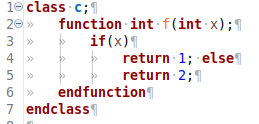 |
 |
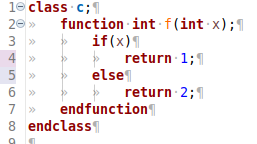 |
 |
Parameters (ro.amiq.vlogdt/format.indent.params) - This option affects module ports and parameters, function and task arguments, class parameters:
Leave as is (1)
One per line (open parenthesis on the same line) (2) - Each parameter/argument is placed on its own line and the open parentheses is placed on the same line with the parameter/argument receiver
One per line (open parenthesis on the next line) (3) - Each parameter/argument is placed on its own line and the open parentheses is placed on the next line after the parameter/argument receiver
More per line if less than (ro.amiq.vlogdt/format.indent.more_per_line_if_less_than_enable) - It controls whether to place parameters on the same line when their number does not exceed a specified value. This option is available only when the Parameters preference is set to One per line (open parenthesis on the same line) or One per line (open parenthesis on the next line).
More per line (4) - More parameters are placed on the same line
Note: When more parameters get to be placed on a single line and line wrapping is enabled, the parameters may be moved to separate lines as needed to fit within the specified line width.
| Initial code | Leave as is (1) | More per line (4) |
 |
 |
 |
| Initial code | One per line (open parenthesis on the next line) (3) | One per line (open parenthesis on the next line) (3) and More per line if less than set to "3" | One per line (open parenthesis on the next line) (3) and More per line if less than set to "1" |
 |
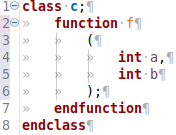 |
 |
 |
Preprocessing (ro.amiq.vlogdt/format.indent.preproc) - This option affects preprocessing directives:
Leave as is (1)
Indent (2) - Indent the preprocessing directives according to the enclosing scope. `ifdef blocks don't increase the enclosed statements indentation.
Indent and increase indentation level (3) - Indent the preprocessing directives according to the enclosing scope. `ifdef blocks increase indentation of its enclosed statements like any other scope language construct.
Indent and increase indentation level except first (5) - Indent the preprocessing directives according to the enclosing scope.`ifdef blocks increase the enclosed code indentation with the exception of the first level preprocessing block.
Move at first column (4) - Move the preprocessing directives at line start. `ifdef blocks don't increase the enclosed statements indentation.
| Initial code | Leave as is (1) | Indent (2) | Indent and increase indentation level (3) | Indent and increase indentation level - except first (5) | Move at first column (4) |
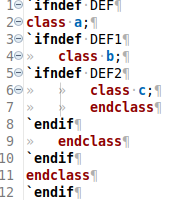 |
 |
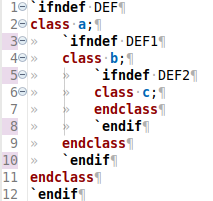 |
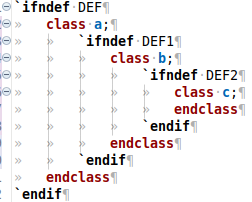 |
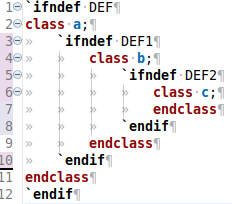 |
 |
Don't indent single line comments at first column (ro.amiq.vlogdt/format.indent.preserve_sl_comment_column_zero) - This option affects single line comments that start at column zero. It is useful to disable the indentation for whole regions of code that are block commented, for example by using Ctrl + /. When enabled, single line comments that start at column zero are not indented.
| Before | After |
 |
 |
Indent multi-line comments (ro.amiq.vlogdt/format.indent.multiline_comments) - This option affects multi-line comments ( /* ... */). When enabled, multi-line comments are indented.
| Before | After |
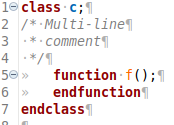 |
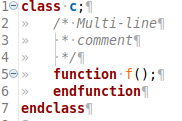 |
Do not indent multi-line content of assigns (ro.amiq.vlogdt/format.indent.skip_assigns) - When enabled, the assign lines are not indented such as to preserve an alignment.
| Before | After |
 |
 |
Do not indent multi-line macro definitions (ro.amiq.vlogdt/format.indent.skip.ml.macro.definitions) - When enabled, multi-line macro definitions are not indented such as to preserve an alignment. This option is available only when the Preprocessing preference is set to Indent, Indent and increase indentation level, Indent and increase indentation level except first or Move at first column.
| Before | After |
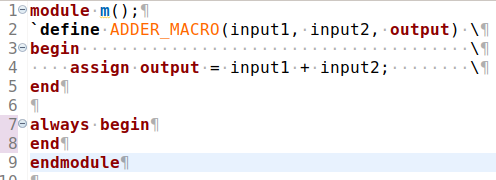 |
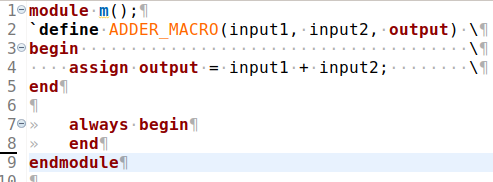 |
Add New Line After Begin And Before End (ro.amiq.vlogdt/format.indent.add_new_line_after_begin_and_before_end) - Controls whether to add a new line after `begin` and before `end`.
| Before | After |
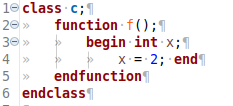 |
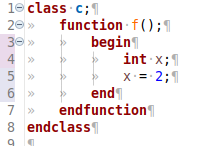 |
Add New Line After End (ro.amiq.vlogdt/format.indent.add_new_line_after_end) - Controls whether to add a new line after `end`.
| Before | After |
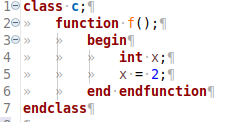 |
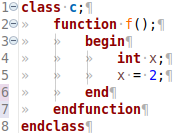 |
Ignore lines starting with (ro.amiq.vlogdt/format.indent.ignore_lines) - Space separated list of line prefixes. A line starting with one of the prefixes is completely ignored, that is it is not indented, nor it contributes to indentation.
| Before | After |
 |
 |
Don't increase the indent Level On (ro.amiq.vlogdt/format.indent.no_indent_keywords) - By default all scope language constructs increase indentation. This option allows you to control which language constructs should increase indentation.
| Before | After ("assert" keyword) |
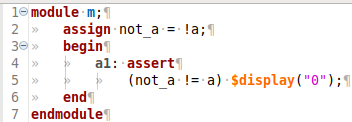 |
 |
Implicit semi macros (ro.amiq.vlogdt/format.indent.implicit_semi_macros) - The code formatting engine depends on detecting some delimiters for properly identifying the proper indentation scope, for example indentation should not increase after if(a) foo1();, but it should after if(a) begin foo();. Semicolon or end is such a delimiter and sometimes it may be encapsulated inside a macro. This option allows you to explicitly list such macros for proper code formatting.
| Before | After |
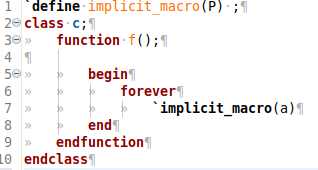 |
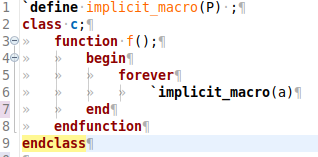 |
Open scope macros (ro.amiq.vlogdt/format.indent.open_scope_macros) and Close scope macros (/ro.amiq.vlogdt/format.indent.close_scope_macros) - An open scope macro increases the indentation level of subsequent code to visualize scoping. A close scope macro decreases back the indentation level. Open/close scope macros are paired, for example: `TEST and `ENDTEST, similar with language keywords like function and endfunction.
| Before | After |
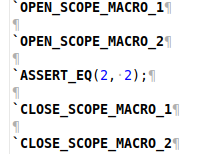 |
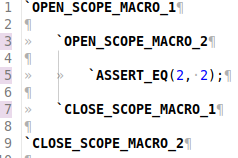 |